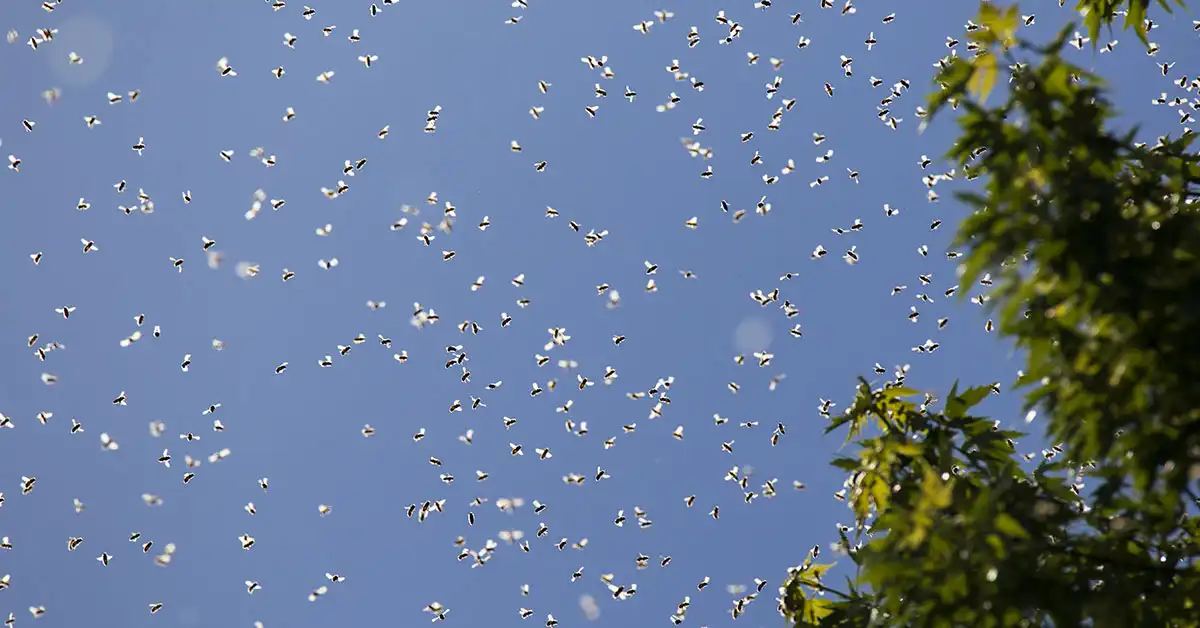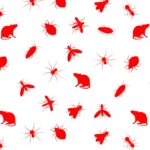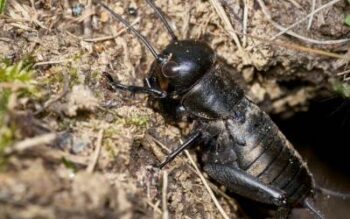
With the arrival of spring comes longer days, warmer temperatures – and insects. An increase in insect activity in the spring is just as inevitable as flowers blooming.
Insects surge in the spring time, which often confuses people because they think insects “die off” in the winter. Then where do all the spring insects come from? It depends, in part, upon what really happened to them during the winter.
How Do Insects Handle Winter?
Insect activity decreases drastically during winter because insects are ectothermic, which people commonly refer to as being “cold-blooded.” The body temperature of ectothermic creatures depends on its external environment.
When winter comes, insects do one of three things – they move, stay active, find a warm location or go dormant. Insects that move, like monarch butterflies and green darner dragonflies, head to warmer climates just like geese and other snowbirds do.
Surprisingly, some bees actually stay active by huddling in the hive and form a “winter cluster” around the queen. Each bee then shivers and flutters their wings to stay active and generate warmth. As temperatures drop, the cluster becomes tighter to conserve warmth. Worker bees rotate positions, so no single bee gets too cold by being on the outermost part of the cluster. Honey provides the nutritional energy bees need to shiver and ensure the hive’s survival.
Other insects survive the winter much like we do – by hiding in warm locations. While people commonly talk about mosquitoes “dying off” in the fall and winter, in reality they find spots, like inside wall cavities, where they stay warm. Elm leaf beetles will do the same or hide in attics. Wasps and yellow jackets like to nest in eaves and overhangs during cold weather.
Hibernation versus Diapause
The fourth category of insect, those that go dormant, is the largest. It’s how most insects survive the winter.
While commonly referred to as “hibernation,” the correct term for dormant insects is “diapause.” Hibernation is only for warm-blooded animals and is a stage of inactivity that occurs only in winter.
Diapause is a dormant stage of development that can occur in any climate that isn’t conducive to an insect’s survival. While winter is a common cause, it’s not the only one. During diapause, an insect’s activities and growth are suspended and their metabolic rate stays just above what is needed to live. Before entering diapause, insects will typically search for some kind of shelter such as burrowing into the ground, hiding in tree trunks, under rocks, etc.
For some insects, like termites, what they do during winter depends on the exact species and location. Subterranean termites, for example, dig into the soil below the frost line to stay warm in winter. Drywood termites burrow into dry wood for safety. Termites that have gotten into a heated home can be active year-round. Regardless of the type of termite or where they spent the winter, termites tend to swarm in spring which might be how a homeowner realizes termites invaded their property.
Spring Awakening
Regardless of which method insects use to survive the winter, when spring arrives, insects become prominent and emerge from hiding places or return to active phase. This surge is why you see so many insects in the spring. Insects don’t actually “die off” in the winter. In fact, mild and short winters can contribute to larger insect populations from a longer breeding season.
So, it’s not your imagination that you see more insects in spring nor is it that you simply notice them because you’re outside more. Insects of all types are active in much greater quantities in the spring as they emerge from diapause or hiding places in your home. That’s no reason to let insects bug you, though.
Call Arrow To Handle Spring Insect Infestations
If termites, carpenter ants, carpenter bees or other insects are invading your home or business this spring, you need the pest control experts at Arrow Exterminating to help you. Arrow will help identify if you have a problem, and then we’ll explain our plan to stop your infestation. To get started, contact Arrow today.




